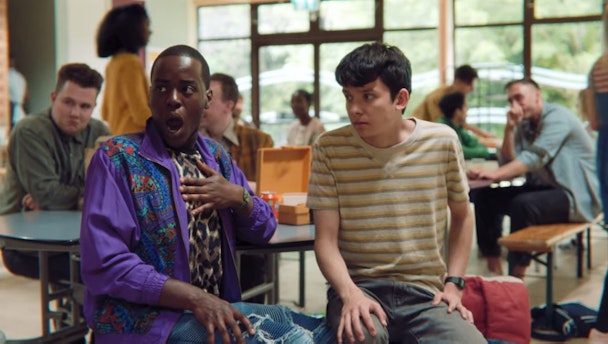Genre is dead and marketers should pay attention
The runaway success of shows like Sex Education and The End of the F***ing World on Netflix have deliberately disregarded boundaries and show that genre is dead.

Genre is dead and marketers should pay attention
In music, TV and society, walls are being torn down and replaced with something powerful that refuses to be labelled. It’s time the marketing industry did the same.
Sex Education, a smash hit for Netflix in the US and the UK puts British kids in a high school setting; colliding Jocks, Beer Pong and baseball jackets with British English accents, slang, and a Wye Valley location. You can find the same cultural intersectionality in the awesome End of the F***ing World series from Channel 4. They’re strange and familiar at the same time. But mostly, in a samey world they feel fresh.
2019’s summer hit ‘Old Town Road’ by Lil Nas X combines elements of trap, rap and country. It was eventually removed from the Billboard country charts because it lacked ‘country’ credibility. It nods to multiple genres but isn’t really any genre at all.
Streaming has enabled us to listen to a much wider variety of genres so no wonder it is having an impact on Gen Z music-makers too. Check out the unconventional sound of US duo 100gecs ripping elements from their favorite genres to create something truly anarchic.
Just as Gen Z is transcending the traditional boundaries of gender and sexuality so they’re embracing sounds and styles that defy easy categorization.
This open-minded, diverse and inclusive attitude to taste - and to make - is exactly what the world needs right now. We need provocative, hard-to-classify new ideas because only they can puncture the barriers rising up all around us. The world demands a glimpse of a different future.
Genre is also busy dying in the worlds of marketing and creativity.
The mashing together of consultancies and agencies is a powerful example of collapsing silos around the customer experience. Though the jury is still out on the impact of Accenture’s buying spree on their ability to create truly genre-defying marketing output.
Big consultancies are notoriously siloed in their own right and it isn’t clear yet that they’ve developed a genuinely fluid business model between those labelled ‘creatives’ and those labelled ‘consultants’. But the ambition is undoubtedly there.
The truth is it takes hard work to bring together people with very different perspectives, cultures and ways of working. We need to double-down on ‘wholebrain’ teams, deliberately selected for neurodiversity. We do it not just because its ethically the right thing to do but because repeated research shows that it is the best way to crack complex problems.
But you have to build a secure and inclusive environment if you want genre-defying thinking to emerge. We find that the best concepts and breakthroughs happen at the intersections between our people coming from management consulting, product innovation, commercial strategy, agency planning, and computer science.
Everyone in the team has to cede ground and allow themselves to be infused with the styles and habits of others but each, in turn, discovers a new way of seeing the world. Clients love it because it means unconventional ideas and hybrid capabilities not easily available on the market.
Unlike the leading edge of culture-making, too many in the marketing world are still obsessed with labels and classifications. The old guard in the creative industry pays a lot of lip service to the ‘idea can come from anywhere’ adage.
Too often though they’re reinforcing old stereotypes of who is truly ‘creative’ and who should be permitted to do the ‘making’. This explains why they’ve been blindsided by shifts in the balance of money and power in the industry: They didn’t just miss seeing it coming, they refused to.
What’s happening on Netflix and Spotify is a signal of what’s coming in business and marketing. Provocative, fresh marketing ideas that cannot be classified easily into genres will raise the table-stakes for all. This is the point where the old guard and the whole polarizing apparatus of an industry that tells you what you can and can’t do, starts to implode. That cannot but be a good thing - unless that is, you’re trapped in a silo of your own making.
In particular, the complexity of the sustainability challenge that faces us requires a new kind of thinking. It requires people able to game a complex system and come out on top. We all need an approach that will jump us out of the ruts and paths that constrain potential solutions today. That’s why whole-brain teams need to work on it.
Silos and the narrow-mindedness that go with them have no place in the world we’re building. In the words of Billie Eilish “I hate the idea of genres.”
Here are three ways for marketers to move beyond genre.
Think of the last three problems you faced. It is likely you used the same data, from the same sources, using the same models, the same rules of thumb, the same processes and spoke to the same people. It is unlikely this gave you a genre-busting breakthrough. Change-up at least two of those.
Stop the strategic shootout between competing marketing silos. You need an overarching go to market strategy and should not be diluting it with layer after layer of increasingly dislocated ‘executional strategies’. It's inefficient. Build a team of strategists able to fluidly travel across genres.
Build or hire a neuro-diverse and inclusive team with a culture of psychological safety. They will transcend the labels, giving you never seen before disruptive ideas. If you hire endlessly in your own image, you’ll end up with a monolithic team. When you’re collectively reviewing candidates, if you’re the decision-maker, make sure you speak last.
Leo Rayman is the global chief executive officer of Grey Consulting.
